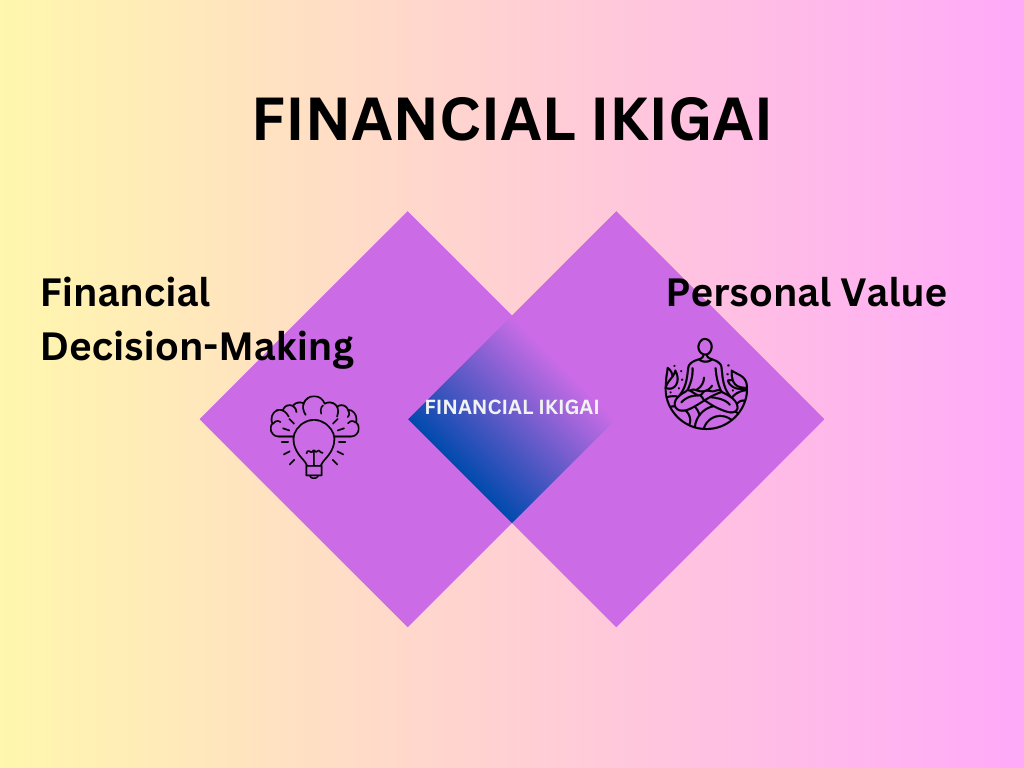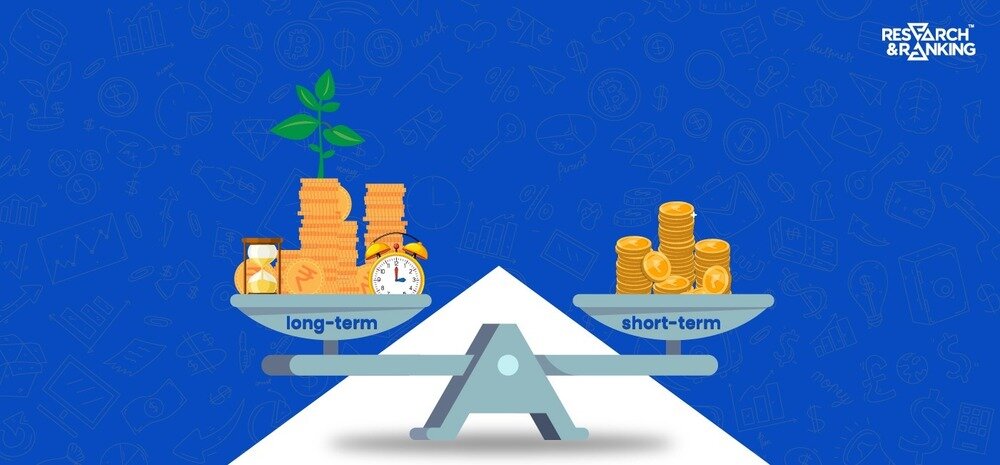Introduction
When it comes to managing your finances, it’s essential to have a clear understanding of your short-term and long-term goals. Short-term financial goals address immediate needs and have a shorter timeframe. While long-term financial goals involve extensive planning and fulfilling larger aspirations over a longer period.
Striking the right balance and prioritizing your financial needs can make a significant difference in achieving financial wellbeing. That’s where the concept of financial IKIGAI comes into play.
Aligning your short-and long-term financial goals and adopting smart strategies for prioritization can pave the way for a secure and fulfilling financial future.
In this article, let’s explore balancing your short-term and long-term financial goals, delve into the concept of financial IKIGAI, and provide insights into strategies to prioritize your financial needs. Focusing on these key aspects gives you the knowledge and tools to embark on successful financial planning.
What is Financial IKIGAI?
IKIGAI: The essence of finding meaning and fulfillment by aligning passion, mission, vocation, and profession. Financial IKIGAI means identifying what truly matters to you and integrating those values into your financial decision-making. You can find meaning and satisfaction in managing your finances effectively. It is essential in achieving a sense of purpose and fulfillment in financial planning.

Balancing short term financial goals and long term financial goals plays a crucial role in the framework of financial IKIGAI. It entails adopting strategies that prioritize your financial needs and allocate resources accordingly.
You can navigate the present while securing a stable financial future. This holistic approach promotes financial wellbeing and empowers you to make choices that align with your values and contribute to your happiness and fulfillment.
Effective Strategies To Prioritize Financial IKIGAI
Assessing your current financial situation comprehensively is important. It involves evaluating your income, expenses, debts, and savings to understand your financial health. You can find areas for improvement and make informed decisions.
Once you have assessed your financial situation, the next step is to identify short-term and long-term goals. Short term financial goals may include building an emergency fund or paying off high-interest debts, while long term financial goals can include saving for retirement or purchasing a home. Defining these goals clearly is essential to provide direction and purpose in your financial journey.
Setting SMART Goals
Setting SMART goals is key to ensuring effective execution. SMART stands for Specific, Measurable, Achievable, Relevant, and Time-bound.
- Specific: Financial goals should be clear, well-defined, and focused on a particular outcome.
- Measurable: Financial goals should be quantifiable, allowing you to track progress and determine when they have been achieved.
- Achievable: Financial goals should be realistic and within reach, considering your resources, abilities, and constraints.
- Relevant: Financial goals should align with your objectives and contribute to your long-term vision or desired outcome.
- Time-bound: Financial goals should have a specific timeframe or deadline, providing a sense of urgency and accountability.
Prioritize your financial needs to achieve your desired financial outcomes.
Financial Planning for Short-Term Goals and Long-Term Goals
| Financial Planning Aspect | Short-Term Financial Goals | Long-Term Financial Goals |
| Timeframe | Short-term (typically within a year) | Long-term (spanning several years or more) |
| Focus | Immediate needs and objectives | Future aspirations and financial security |
| Key Goals | Building emergency funds, managing expenses, paying off debt | Retirement planning, wealth creation, asset accumulation |
| Planning Approach | Budgeting, expense management, priority setting | Strategic planning, investment strategies, long-term growth |
| Monitoring and Adjustments | Frequent monitoring and adjustments to align with changing needs | Regular review and adjustments to ensure progress towards milestones |
| Emphasis | Meeting short-term financial milestones | Achieving significant milestones over an extended period |
| Required Commitment | Short-term commitment and regular monitoring | Long-term commitment and patience |
| Importance of Review | Regular evaluation and adaptation to changing financial circumstances | Periodic review to assess progress and make necessary adjustments |
Striking Financial Balance for Success
Balancing short-term and long-term financial goals is crucial when you want to achieve your financial goals. It involves maintaining a balance between immediate needs and long-term aspirations.
You can create a solid foundation for financial success by allocating resources wisely to address short-term needs and simultaneously investing for long-term growth and stability.
Striking this equilibrium requires effective strategies for prioritizing financial needs, ensuring that short-term goals, such as managing expenses and building an emergency fund, and long-term goals, such as retirement planning and wealth creation, are given appropriate attention.
Building Financial Wellbeing
Financial wellbeing involves monitoring and adjusting goals, seeking professional advice, and developing good financial habits. These practices foster discipline and optimize financial decisions, leading to long-term success and security.
Case Study: Deepa’s Journey to Financial Empowerment with Financial IKIGAI
Deepa was an Air Hostess. She earned ₹6,00,000 annually. She faced financial instability with outstanding loans amounting to ₹200,000 and no savings. Discovering financial IKIGAI, she embarked on a transformative path by switching jobs. She always wanted to be a part of clean energy.
So, she started working as a Clean Energy Project Manager. Her salary also doubled. Her salary was ₹12,00,000 annually. Deepa aligned her values with her financial goals and developed a clear roadmap. She allocated ₹5,000 to debt repayment every month, ₹20,000 to building an emergency fund, and ₹40,000 for long-term investments; the rest was used to manage her expenses.
Deepa sought professional advice and consulted a financial planner who provided strategies for growth. Through discipline and determination, Deepa can pay off her debt in three years, build an emergency fund of ₹2,40,000 a year, and start investing for her future. Financial IKIGAI empowered Deepa, leading to financial stability and fulfillment.
Final Words
Achieving financial wellbeing through financial IKIGAI requires balancing short-and long-term financial goals. By prioritizing and allocating resources wisely, you can navigate your financial journey with purpose, achieve milestones, and secure a fulfilling and stable future.
FAQs
Why is short-term financial planning important?
Short-term financial planning helps you manage your day-to-day finances, build an emergency fund, and address immediate financial needs efficiently.
What strategies can I use for successful long-term financial planning?
Effective strategies for long-term financial planning include:
● Diversifying investments.
● Regularly reviewing and adjusting financial plans.
● Seeking professional advice to optimize wealth accumulation.
How can I overcome the challenges of long-term financial planning?
There are many ways to overcome the challenges of long-term financial planning, such as:
● Having a financial cushion
● Being flexible with your plans
● Investing for the long term
What are some challenges to long-term financial planning?
There are many challenges to long-term financial planning, such as:
● Unexpected expenses
● Changes in your financial situation
● Market volatility
What are some challenges to short-term financial planning?
There are many challenges to short-term financial planning, such as:
● Unexpected expenses
● Changes in your financial situation
● Job loss
How do I track my progress towards my short term financial goals?
It is important to track your progress toward your short-term financial goals so that you can
see how you are doing and make adjustments as needed. There are many different ways to
track your progress, such as using a financial planner, a spreadsheet, or a budgeting app.
How useful was this post?
Click on a star to rate it!
Average rating 3.9 / 5. Vote count: 18
No votes so far! Be the first to rate this post.

